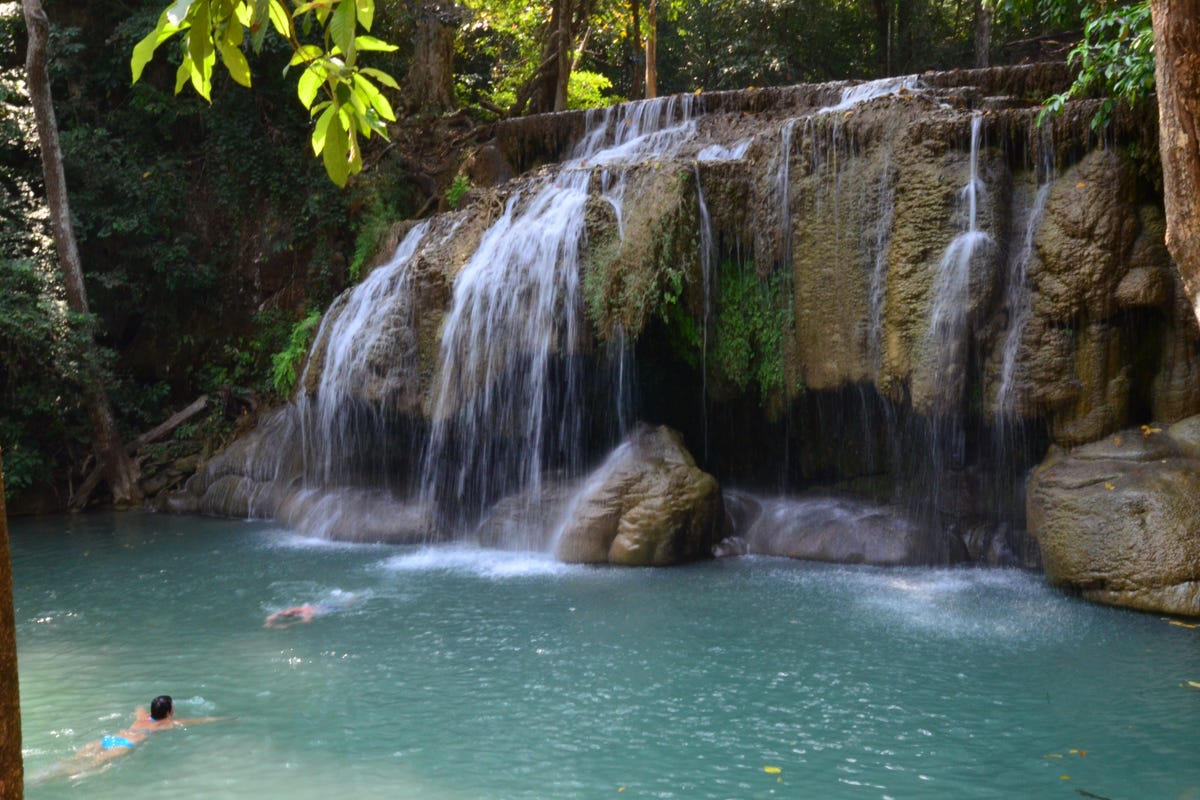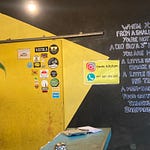Years ago, I was at the Jolly Frog Guesthouse in Thailand’s Kanchanaburi. The guesthouse was a backpacker haven. It had a lawn garden and rooms running around the edge with a few more down floating on the river. The lawn had hammocks strung and deckchairs scattered. The restaurant was cheapish and the beer cold. Many a stay was extended.
I was travelling with a Swiss girlfriend at the time, and she had a firm grasp on a gaggle of languages. Five from memory. One night at the ever jam-packed restaurant, we needed to share a table with two older Austrian guys. Nikki and I were speaking in English and after a brief “hello” to the Austrians, we ignored each other.
The Jolly Frog lawn. Not a passed out backpacker in sight. Photo: Stuart McDonald.
I don’t remember what Nikki and I were talking about. I do remember her glancing at the Austrians (who were speaking German), and getting annoyed. Then, she said she wanted to leave, so we left.
It turned out the Austrians were talking about us, assuming Nikki couldn’t speak German. They were talking about her, how she looked, if her dinner would make her fat, and how we were a miss-matched couple.
Lovely.
Sunset by the river. Photo: Stuart McDonald.
An amusing side-note here, I don’t know if this is a myth or not, but it still makes me laugh to think about it. The staff at Jolly Frog were legendary for their abruptness. The story goes, one night a guest was at a table, and as they waited to make their order, the staff said, in Thai, “What do you want you fat pig?” Little did they know the person they were speaking to was a fluent Thai-speaking guidebook author.
Ops. One must always be wary of making too many assumptions.
It is a common caricature, the tourist expecting a local to speak their language. When the local doesn’t understand, they speak louder, annunciating each word like a piston. Louder again. Yet still, they’re not understood.
“DO YOU SPEAK ENGLISH?”
Like the guest at Jolly Frog, I’d like to think this sort of behaviour is a myth, but far from it. I’ve seen—and heard—it with my own eyes and ears. Like something out of a Fawlty Towers episode—I Googled it and sure enough, there’s a snippet right on point.
Fawlty Towers has not aged well, but Basil illustrates my point in this short excerpt.
Travellers can have all sorts of expectations, some sensible, some less so. Language though has always struck me as a funny one. As anyone who has studied a new language would know, getting a solid grasp can take years of study and practise. I’m in awe of guides who not only have solid English but also have no trouble with English accents—unlike me!
So why is there this expectation that the locals will speak your mother tongue, but not you theirs? I’m not suggesting people invest in a year of study before a Thai beach break, but you can learn a lot on a six-hour flight. Start with the simple things—greetings, how to say thank you and please. Learning the numbers in any language is both rudimentary and super handy. Yet many don’t bother.
The forever “almost sinking” River Guesthouse. Photo: Stuart McDonald.
It isn’t only about learning words that will make your trip easier, but also showing locals you’re making an effort. Some get unnerved when their attempts bring laughter, but, most of the time, they’re laughing with you—not at you. Everyone knows learning a language is hard for most.
Another thing, you know I’ve never seen a Thai tourist yelling “Do you speak Thai?” at a Sydney ticket vendor, yet I’ve seen this innumerable times in Thailand—with the roles reversed.
I guess a lot of it is acknowledging you’re a guest. That the country and its people are not there as your plaything. This sort of attitude can manifest itself in plenty of ways, not only language, but it is invariably a bad look.
If you learn how to say waterfall in Thai, you might find more places like this. Erawan Falls. Photo: David Luekens.
The other thing about language is it is never only about words. It is a window into another culture, their beliefs and their way of life. A simple Thai example is “kin khao”—literally “eat rice”, but in Thai, it means simply to eat. There—you just learned a phrase. Jokes aside, learning any language, even only a little bit of it, and you’ll learn far more than words. Pick up a language book and you’ll see it full of slices of life, showing the connection between language and everyday life.
So what am I doing going on about language?
Most people can’t travel to Southeast Asia at the moment. They’re at home, waiting for countries to re-open, flights to re-start, and visas to be something other than the name of a credit card. Why not spend a little bit of that waiting time, working on the basics?
The bus to Erawan costs haa-sip baht. Numbers are useful. Photo: David Luekens.
You need not go and start a Bachelor degree in the Vietnamese language, (though do feel free!). There are plenty of free language courses online that will at least cover the basics. The coverage of Southeast Asian languages on Duolingo is limited but slowly improving. Their base product is free, and you can learn useful phrases like “My house has a million cats in it”. Seriously.
If the last thing you want to do is stare at a screen for another hour, look into courses at local colleges or Community Centres. You might be surprised how much is available. Or, go the old route, and go pick up a textbook.
It’s not only about learning the language, it is also about learning more about the country and its people. Every word will bring you that little bit closer.
Sometimes though, words in any language will fail you. Photo: David Luekens.
Then, when travel does re-open, you’ll never be that dude berating a guide for not speaking English. Best of all, if you ever find yourself at Jolly Frog, you’ll be able to say:
นี่ไม่ใช่หมูอ้วนนะ หยาบคายนะคุณน่ะ ขอผัดไทยใส่ไก่หน่อยสิ
To save you running this through Google translate, it translates roughly to:
“I’m not a fat pig. You’re rude. I’d like the pad thai with chicken.”
Thanks to my friend Kip for the Thai translation!
Couchfish is 100 percent independent and reader-supported. If you’d like to show your support, become a paying subscriber today for just US$7 per month, or simply share this story with a friend. Thank you!
















